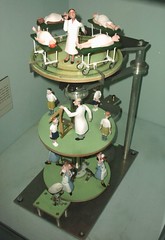May 03, 2008
Cash for Health: a Specific Tool
 I blogged both on Ethics in the News and CNE Health about the new World Bank project to try paying people for not getting AIDS - it is an interesting combination of health, economics and ethics.
I blogged both on Ethics in the News and CNE Health about the new World Bank project to try paying people for not getting AIDS - it is an interesting combination of health, economics and ethics.
It looks like it could work; whether it is cost-effective we have to wait and see. I'm mostly worried that we might not get that data. Outside groups are likely to get into moral panic mode since the project touches on paying people for sacred values such as health and sexual behavior - that can easily cause Tetlockian moral outrage. But the whole idea of "reverse prostitution" is a clever noncoercive reversal of the cognitive biases that make undersupply their own health.
At the same time it does not scale to any situation. As a friend exclaimed, it discriminates against the already sick who cannot get any extra money. The goal here is of course just to change the habits of healthy people. Maybe some kind of bonus system could be envisioned that rewarded safe sex habits among infected people, but checking them objectively and efficiently would be hard.
Moving the same system to other conditions or the west may be hard: it is one thing to pay people for avoiding an infectious disease that is relatively easy to avoid, another thing to pay people for lifestyle illnesses/conditions such as obesity. Given natural variation in vulnerability and the chances to do something about them the rewards would fall more unevenly: in the west rewarding people for not getting fat would tend to reward well-educated middle class people. Still, adding an incentive for regular health checkups might be a good idea. If it was done as a tax break it would favor the well-off and long-term discounting, but with a cash reward it would promote checkups among the less well-off and more short-term thinking people. Whether the information from the checkup would have any useful health effect is another matter, of course.